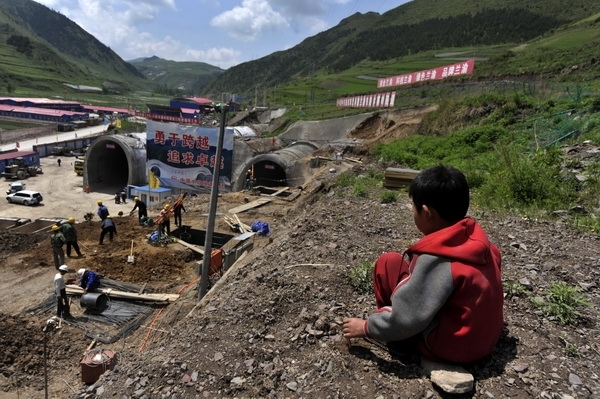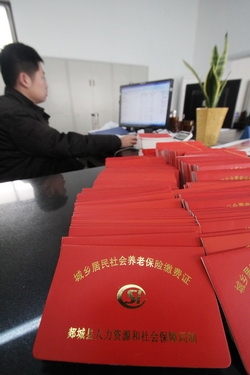

Highlights from the EO print edition, No. 558, Feb 27, 2012
Investigative Report: Lead Poisoning of over 100 Children in Guangxi Province
News, Cover
~ In 2011, children in three villages in Guangxi Zhuang Autonomous Region were found to have excessive levels of lead in their blood.
~ The EO's reporter went to Chehe Township on Feb 11 to investigate the issue. The sick children's parents accused the local smelting plants, stating that the exhaust emitted from the plants had caused the lead poisoning.
~ The EO calculated that there are over 100 children in the township aged 1-5 with high levels of lead in their blood.
~ The local government blames the lead poisoning on several factors: the village's soil contains lead as the land is on a metallogenic belt, the exhaust emission by vehicles travelling along the nearby national highway and leaks from the smelting plant. But villagers are unconvinced.
~ "Heavy metals are only found at least several hundred meters or even thousands of meters below the surface and the metals won't have impact on people If they are not exploited, transported or processed," said one of the villagers who doesn't buy the government's argument that the hightened lead levels in local children's blood is related to the village being located on a metallogenic belt.
~ Villagers also don't agree that vehicle exhaust is a major cause of lead poisoning. They ask, "why are children in other regions that are close to national highways healthy?"
~ The local government has already initiated a plan to relocate some of the villagers.
~ It seems the government chose the cheaper of two options, as if they were to attempt to remove the plant from the village, they would have been liable for compensating the owners of the plant, because, as one official said, "when these factories were built, they didn't violate any policies."
Original article: [Chinese]

Beijing Becomes Second City to Pilot VAT Reform
News, page 2
~ The EO learned that Beijing's application to launch a pilot tax reform, which will involve the gradual replacement of corporate income tax (营业税) or turnover tax with value added tax (VAT), was recently approved. The city plans to formally introduce the pilot on July 1, 2012.
~ Last November, the State Council gave approval to Shanghai to become the first city to pilot similar reforms. After that announcement, Beijing was quick to follow suit and just one month later submitted its own application to conduct pilot reforms.
~ The EO also learned that Shenzhen, Jiangsu, Tianjin and Chongqing have also submitted applications to launch similar projects.
~ An official from the Shenzhen tax sector said, Shenzhen needs to apply for permission to participate in the pilot, otherwise the city will be unable to compete on an equal footing with other large cities, as Shenzhen has a relatively well developed service sector. The VAT pilot launched in Shanghai is specifically focused on easing the tax burden of companies operating in the service sector.
~ Ni Hongri (倪红日), a researcher with the State Council Development Research Centre, explained to the EO that rhe reason why all these cities were rushing to apply for permission to launch their own pilot represented something of a panic response as they feared that Shanghai's pilot would inevitably attract capital to Shanghai.
~ In Ms. Ni's view, the pilot will inevitably result in an imbalance in terms of the tax burden placed on different cities and thus the VAT reform is likely to spread rapidly across the country.
Original article: [Chinese]

Eastern Officials Go West
Nation, page 10
~ On Feb 2, Gan Lin (甘霖), the former party secretary of the southern coastal city of Zhuhai, was recently appointed as the new deputy governor of Sichuan province. Aside from Gan, many eastern officials have been transferred to the west recently, including Wang Sanyun (王三运), who originally served as the deputy party secretary in the eastern province of Fujian, before being transfered to the position of governor in Anhui Province and then later took up the position of party head in Gansu Province. Chen Min'er (陈敏尔) who was previosuly the deputy governor in the eastern coastal province of Zhejiang, which is just to the south of Shanghai, now serves as the deputy party secretary in the poor south-western province of Guizhou and Zhao Kezhi who was the deputy governor in Jiangsu province has been appointed the new provincial governor in Guizhou.
~ According to analysts, the westward movement of eastern officials is part of a strategic plan being pursued by the central government with the aim of boosting economic development in the western regions of the country.
~ The current imbalance in terms of the level of economic development in the east and west of China, is one of the major reason for the westward transfers.
~ "The most important things eastern officials bring with them is not funds, but their ideas," says Xu Fengxian (徐逢贤), a researcher with the Chinese Academy of Social Sciences. "The development of the west also includes the transfer of industries from the east to the west, and thus experienced officials can help provide support and advice on achieving economic development."
~ Meanwhile, the central government has also been emphasizing the subsequent promotion of officials who have served in more remote postings. According to data, many officials who have been transferred to the west are more likely to rise up the career chain a little faster than their colleagues who remained in the east.
~ However, eastern officials not only bring development opportunities to the west, but also problems. "Local officials might be influenced if transfers are not well conducted," saod one expert the EO talked to, noting how "when some eastern officials just come for the opportunity to be promoted, it means that the room for career advancement among local officials can be limited." The professor also added that, "the ability of officials is the most important factor." Moreover, officials should have a long-term strategy and pay more attention to environmental protection in the west instead of focusing solely on economic development, said Xu.
Original article: [Chinese]

Market, page 17
~ The stock market was disappointed by last week's announcement from the Ministry of Human Resources and Social Security, which said that pension funds won't be channeled into Chinese equities in the near future. The EO has learned, however, that an unprecedented review is underway into the management and operation of pension funds in China.
~ The review has just begun and is being run by the National Audit Office, which will submit its findings to the State Council as part of a project to reform pension policies.
~ A finance ministry official told the EO that each level of government will be reviewed by the tier directly above it, so a state inspection group will check the provincial level, and provincial-level groups will check the city level. The official said the review could take six months, while someone in local government told the EO that "it may take two months to check one province."
~ "The investigation may show how huge the pension gap will be in the future," said Wen Zongyu (文宗瑜), an office director at the Ministry of Finance. "The [sum of] 1.92 trillion yuan (by the end of 2011) is far too small for an aging country of more than a billion people, and [the scheme] needs subsidies from the local governments," says one pensions expert.
~ Hu Xiaoyi (胡晓义), deputy minister for Human Resources and Social Security, said on Feb 23 that there will be various policies on investing pensions into the stock market.
~ The finance ministry's Wen says the policies might differ for each province. Zheng Bingwen (郑秉文), a director from the Chinese Academy of Social Sciences, proposes three schemes, whereby the pension funds would be managed either by local governments, or by separate centrally-supervised institutions dedicated to pensions or by a single central organization.
~ The review is merely the first step towards reforming the system – major issues must be overcome, such as the shortage of funds at local government level, institutional barriers and inter-ministry barriers.
Original article: [Chinese]
Spring Airlines Prepares for Its IPO
Corporation, page 27
~ Spring Airlines, a low-cost airline based in Shanghai appeared on the waiting list of companies that are planning to list on the domestic stock exchange that was published by the Securities Regulatory Commission (CSRC) in early February. The private company could become the fifth domestically-listed aviation company after the four state-owned giants, namely Air China, China Eastern, China Southern and Hainan Airlines.
~ In 2006, Spring Airlines announced plans to launch its IPO on either the Shanghai or Hong Kong boards with Citibank acting as its underwriter. But, in the end, the company decided to postpone the IPO to 2011 due to market volatility.
~ "We have postponed the IPO many times because we were either choosing the place of listing or selecting a securities company. After much preparation and planning, we're finally going to go ahead with it," Zhang Wuan, a spokesperson for the airline told the EO,
~ The company expects to raise over 8 billion yuan though the IPO this time. Zhang revealed that the company would use the funds it hopes to raise in order to double its fleet to 60 aircraft over the coming four years.
~ The reason for the low cost of Spring Airlines is that it only operates on a small number of routes and it doesn't have to maintain a large fleet of aircraft, Li Xiaojin, a professor from the Civil Aviation University of China explained to the EO. As the company expands, costs are likely to increase and the challenge of maintaining its role as a budget airline will be a critical issue for the company after it lists.
Original article: [Chinese]

Antagonists Spitting Bile in Guizhentang Pharmaceutical Dispute
Corporation, page 30
~ The public is still enraged at the planned public offering of a Fujian-based firm whose main business is the sale of bear bile. Analysts have said that the beneficiaries of the scandal will be Guizhentang Pharmaceutical's rivals who don't use bile.
~ There are some 68 licensed bear farms in China. The industry is worth over 10 billion yuan and involves 183 pharmaceutical companies using bile for 123 different traditional Chinese medicines.
~ One of Guizhentang Pharmaceutical's main critics had been the Animals Asia Foundation (AAF).
~ The China Association of Traditional Chinese Medicine, of which Guizhentang is a member, has accused AAF of receiving money from companies that produce synthetic substitutes to bile. The foundation's spokesman Zhang Xiaohai, rejected the allegations and said that AAF is driven by concern for animals' welfare. When contacted by the EO, AAF's finance director Wu Xiaohong was unable to explain the source of the foundation's funds.
~ Guizhentang's founder Qiu Shuhua achieved notoriety with her slogan that "whoever is against Guizhentang is against the nation". Qiu, whose never went to secondary school, said that she was surprised to receive such attention. "I'm a farmer and have a low level of education. I just wanted to say that our business is legitimate and is approved by the government," she told the EO.
Original article: [Chinese]

